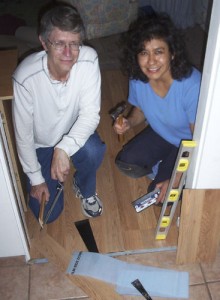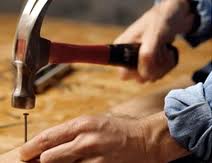Archive for the ‘how to start a real estate business’ Category
Thursday, April 8th, 2010

Here is a recent email that I received from someone who is taking my 7-Week email course, and my response:
Dear Terry,
We bought one fixer upper but are having trouble renting it — any ideas of good places to advertise for a tenant?
Thanks in advance,
Jean xxxx
Hi Jean,
Let me suggest a few techniques that that have worked for me:
1. Place several small For Rent signs on all nearby streets, especially the major intersections. If you get a sign with an arrow on it, you can point the arrow in the direction of your house. I buy the signs at Home Depot or Lowe’s.
2. Hold an “open house” on Saturday and Sunday. People driving by can come in and look around.
3. Contact companies that help people find rental properties. Some will list your property for free. These companies usually contact me.
4. Run an ad on craigslist.org. You can upload photos and describe the qualities of your rental property. The ads are free & I usually get a great response.
I hope you find a tenant soon.
Let me know if you come up with a good technique that I haven’t thought of.
Good luck!
Best regards,
Terry Sprouse
Location, Location, …
One thing I didn’t mention in the letter, but which is perhaps the most important consideration of all in attracting good tenants, is the location of your property. Properties located where people really like to rent are called “opportunity zones” (or “transition zones”). Just as Baskin-Robbins must offer the flavors of ice cream that the public likes, so you must offer rental properties in the areas of town where people want to live.
If your property is located in an area where people don’t like to rent, you will always have trouble finding tenants. For more information about my philosophy on where to invest, check out my EzineArticles.com article The Secret to Increasing Cash Flow – Invest in Opportunity Zones .
Tags:finding tenants, Fix em Up Rent em Out, how to find tenants, location, opportunity zones, renting properties, tenants
Posted in All Things Real Estate, bad tenants, finding tenants, Fix em Up Rent em Out, fixer-upper business, for rent, how I got started in fixer uppers, how to make money renting housing, how to start a real estate business, How to start your own house fix up and rental busines, interviews, investment property, investmet properties, landlording, managing apartments, managing tenants, maximize rental profits, month to month lease, newspaper, opportunity zone, places to advertise for a tenant, quirky tenants, rental houses, rental management, rental properties, rental property, rentals, renting, selecting tenants, tenants, tenents, transition zone | 2 Comments »
Tuesday, February 2nd, 2010

Avoid this guy as a tenant
(more…)
Tags:bad tenants, being a landlord, fix em up class, handling tenants, landlord, managing tenants, tenants
Posted in fixer upper houses, fixer-upper business, fixing rental houses, how to make money renting housing, How to manage tenants, how to start a real estate business, How to start your own house fix up and rental busines, landlording, legal information, managing apartments, managing tenants, rental property, tenants, turn my home into a rental | 5 Comments »
Friday, December 5th, 2008
 .
.
I was recently interviewed by the Arizona Daily Star and responded to a variety of questions related to my house fixer-upper business, such as:
Why did you write the book?;
How did you get into the fixer-upper business?;
Can you give away one secret of success?;
as well as several other questions that inquiring minds want to know the answers to.
Here is the complete interview, entitled “UA researcher fixes up houses on the side, writes about it.”
See also:
For yet another newspaper interview that I did see: Fixer Upper Business Highlighted in Newspaper Article.

 Subscribe in a reader
Subscribe in a reader
Share this: del.icio.us | Digg | Ma.gnolia | Reddit | Stumble Upon |
Tags:Fix em Up Rent em Out, fixer upper house business, fixer upper houses, Josh Brodosky, newspaper interview, secret of success, why write a book
Posted in book publishing, book writing, buying fixing renting rehabs, buying real estate, do it yourself, Fix em Up Rent em Out, fixer upper book, fixer upper houses, fixer uppers, fixer-upper business, fixing rental houses, how I got started in fixer uppers, how to make money renting housing, how to start a real estate business, How to start your own house fix up and rental busines, investing in real estate, investmet properties, learn to invest in real estate, newspaper, newspaper articles, real estat investing, real estate books, real estate investing, real estate principles, recession and real estate, rental houses, rental property, success | 2 Comments »
Monday, August 4th, 2008
Tags:investing in real estate, social media Facebook, starting a fixer upper house business
Posted in Fix em Up Rent em Out, fix up houses, fixer upper houses, fixer uppers, fixer-upper business, how to start a real estate business, How to start your own house fix up and rental busines, Uncategorized | No Comments »
Monday, July 14th, 2008
Buying fixer upper houses and converting them into rental houses is a great business. And anyone can do it. You don’t need a certificate, you don’t need a degree, and you don’t need anyone’s permission. You just do it!
To view a condensed version of how I got started in the fixer-upper business, check out my article at ezinearticles.com. This is the version with no bells or whistles, and no accompanying three-part harmony.
The townhouse closing may or may not happen today. If not, Angy has to catch a flight out of town tomorrow. In that case, we will have to sign power of attorney over to me so that I can sign for both of us at closing.
Just like the recipe for my famous extra-chewy chocolate chip cookies, the plot thickens!

 Subscribe in a reader
Subscribe in a reader
Share this: del.icio.us | Digg | Ma.gnolia | Reddit | Stumble Upon |
Tags:fixer upper houses, how I got started, investing in fixer uppers
Posted in buying fixing renting rehabs, buying real estate, closing, do it yourself, fix up houses, fixer upper houses, fixer uppers, fixer-upper business, fixing rental houses, house buying, how I got started in fixer uppers, how to start a real estate business, How to start your own house fix up and rental busines, investing financial independence, investing in real estate, investing in your spare time, investment house, investment property, investments, investmet properties, making repairs | No Comments »
Saturday, May 31st, 2008

My wife and I laying laminate flooring
‘
The Tucson Citizen Newspaper highlighted the fixer upper business that my wife and I operate in Thursday’s paper.
Entitled Learn to Fix Up Houses, Rent Them Out, it describes some details about our business and mentions my book.
Who says newspapers aren’t interesting anymore?
To read another insightful (to me, at least) newspaper article that I did, see “Fix em Up, Rent em Out” Featured in Newspaper Article.

 Subscribe in a reader
Subscribe in a reader
Share this: del.icio.us | Digg | Ma.gnolia | Reddit | Stumble Upon |
Tags:fixer upper house business newspaper article, learn to fix up houses rent them out, tucson citizen
Posted in buying fixing renting rehabs, Fix em Up Rent em Out, fixer upper houses, fixer-upper business, fixing rental houses, how to start a real estate business, How to start your own house fix up and rental busines, invest real estate repai and sell or rent, investing in real estate, investing in your spare time, learn repair skills, learn to invest in real estate, newspaper, newspaper articles, real estat investing, real estate books, real estate investing, real estate principles, rental properties | No Comments »
Wednesday, October 17th, 2007
My book “Fix ’em Up, Rent ’em Out: How to Start Your Own House Fix-up and Rental Business in Your Spare Time” is now available at amazon.com.
Editorial Review:
This book teaches how to get started buying, repairing and renting out fixer-upper houses in your spare time. It covers various aspects such as house selection, what to repair, handling tenants, managing the books, and taxes. The book describes the two safest ways to make money in real estate, and one chapter is devoted the “Zen of Repairing Properties.” The author uses illustrations from his own experiences, humor and motivational examples to encourage the reader down a path that will be both financially rewarding and deeply satisfying.
Comments on “Fix ’em Up, Rent ’em Out”:
“Great information for anyone starting out in the fixer-upper business. Easy to understand, written by an author who has served his apprenticeship in the trenches.”
— Fixer Jay P. DeCima, Investor and Author
“Terry Sprouse has created a profitable rental business with his family in their spare time. He’s accumulated more net worth in six years than most people have after a lifetime of saving. What sets him apart is he took action.”
— Bob Zachmeier, Investor, Educator, Author
“Sprouse has created an approach to home restoration and wealth generation that works. This book provides simple guidelines for restoring homes, but also weaves in guidelines for restoring sanity to our crazy lives. Sprouse has the wit of Will Rogers and the business savvy of Donald Trump. His simple, direct, honest philosophy of sustainability and responsibility is profound.”
— M. D. Matlock, Ph.D., P.E., C.S.E., President, American Ecological Engineering Society, Award-winning designer of green neighborhoods for Habitat for Humanity, Professor of Ecological Engineering, University of Arkansas.

 Subscribe in a reader
Subscribe in a reader
Share this: del.icio.us | Digg | Ma.gnolia | Reddit | Stumble Upon |
Tags:amazon.com, Bob Zachmeier, Fix em Up Rent em Out, fixer upper rental houses, Jap P. DeCima, M.D. Matlock
Posted in create wealth in real estate, Fix em Up Rent em Out, fixer uppers, how to start a real estate business, How to start your own house fix up and rental busines, real estate books | No Comments »
Thursday, September 27th, 2007

Should you invest in fixer upper rental houses the old fashioned way, or try to learn it all in 2 days?
Yesterday, I received an email announcement inviting me to a real estate boot camp. It read,
The Ultimate Investor’s Bootcamp!
“You’ll Be Spoon-Fed Cutting Edge Tactics & Insider Secrets. And You’ll Walk Away Knowing Exactly How To Create Stunning Business Success & Vast Amounts of Positive Cash Flow.”
New investors must wonder, “Do I need to attend workshops like this to learn to invest in real estate?” It sounds tempting to be able to learn everything you need to know about investing in 2 days. Who wouldn’t want to take a shortcut like that?
My response is that you might learn some good techniques on investing at a bootcamp, but is it worth the money? I’ve been to free introductory presentations that say you will learn money making techniques about real estate investing, but it turns out to be a sales pitch to get you to sign up for an expensive “mentoring” program. Since the email with the above ad did not mention any price for the bootcamp, I imagine its not cheap. The important thing about bootcamps and mentoring programs is that you can spend a lot of money and only learn a little information. Worst of all, you can get roped into buying a program that sounds good, but may not be as good as it sounds.
My philosophy is more of a “do-it-yourself” approach. I like to cut corners, save money, and not take too many chances with my money. I’m the kind of guy who wears both a belt and suspenders to hold my pants up. I really like play it safe.
To get started in real estate investment, I would recommend to start by reading some of the excellent books that are available, such as “Investing in Real Estate” by Andrew McClean and Gary Eldred. I think you can learn more from reading a book like this than you can from going to expensive seminars. It provides information on many aspects of real estate that investors should know, without having a hidden agenda to get you to buy something more. I have mentioned other useful books in earlier blog postings, such as those by Jay DeCima, Bryan Wittenmyer and John Schuab.
You can also learn very useful information by taking real estate investing courses taught at local community colleges. I took one when I was just starting to invest, and it was outstanding. It was taught by a real estate agent who was an investor. The students learned all of the basics from someone who was actually investing in the same community where we would invest. I learned basic techniques that I am still using.
You learn by visiting a lot of houses and talking to owners and real estate agents. Practice calculating how much monthly payments would be for houses that you visit. Talk to other real estate investors. After you have a idea of how the process works, and when you can recognize a good deal from a bad deal, buy a low-priced fix-up house and learn to repair it as you go along. That’s what I did, and 7 years and 6 houses later I am still going strong.

 Subscribe in a reader
Subscribe in a reader
Share this: del.icio.us | Digg | Ma.gnolia | Reddit | Stumble Upon |
Tags:do it yourself, fixer upper rental houses, real estate investing, ultimate investor's bootcamp
Posted in excellent real estate books, fixer upper house books, fixer upper houses, fixer uppers, fixer-upper business, fixing rental houses, gurus, how to start a real estate business, How to start your own house fix up and rental busines, investmet properties, learn to invest in real estate, real estate books, real estate boot camps, rental properties, rental property, rentals, renting, repair, repairing properties, repairing rental houses, repairs | 2 Comments »
Wednesday, September 26th, 2007
This of Part 2 of my reponse to a question asking, “My background is not in the building trades. How do I learn the required skills to start a business in repairing houses and renting them out?”
How to learn the appropriate skills:
3. Draw on the Past
After I got more involved in the repair work of our houses, I thought back about how my father had taught me a lot by example. I recall seeing him construct screened-in porches on various houses that we had lived in. I was too young to help out much at the time, or to appreciate what he was doing, but looking back I realize that it required a strong desire to learn the basic principals, and a sense of self-confidence to build it. He had no formal training in construction, and didn’t have reference books like I do, but he learned by observing other porches that had been built in the neighborhood.
I also have a friend who has made a career out of living frugally. He does virtually all of his own house repair and car repair work. If he gets stuck, he goes to the library and finds books to help him. It helps that he has a background in teaching vocational eduction. We have helped each other with house repair projects over the years, and he is a source of practical advice when I need help.
You too may have family members, or friends, that you can draw insight and inspiration from when it comes to making repairs.
4.Create a House Repair Library
I like to scour the fix-up book areas at used book stores for good buys. I buy a book as soon as I see it if I know that it has valuable information. In the past, I have waited to purchase the book only to return later and find that the book I had wanted was gone. The price you pay will literally be a drop in the bucket compared to the money you will save. I have books on almost every possible repair topic, including electrical wiring, plumbing, flooring, you name it. Some books that offer information on a wide variety of repairs, such as Reader’ Digest “Fix-it Yourself Manual” and Better Home and Gardens Complete Guide to Home Repair,” are also good to have. See my earlier blog for more infomation on recommended repair books.
When a book is not enough, I can usually get good advice on specific jobs at hardware stores, like Ace Hardware. And, you can sometimes get advice on difficult repairs by doing a Google search.

 Subscribe in a reader
Subscribe in a reader
Share this: del.icio.us | Digg | Ma.gnolia | Reddit | Stumble Upon |
Tags:draw on the past, fix em up rent em out start a business, fix up books, learn how to repair rental houses
Posted in buying fixing renting rehabs, buying real estate, do it yourself, excellent real estate books, Fix em Up Rent em Out, fix up houses, fixer upper houses, fixer uppers, fixer-upper business, home buying, house buying, house repair, house repairs, how I got started in fixer uppers, how to make money renting housing, how to start a real estate business, How to start your own house fix up and rental busines, invest real estate repai and sell or rent, investing, investing book, investing financial independence, investing in real estate, investing in your spare time, investment house, investment property, learn repair skills, learn to invest in real estate, learn to make repairs, making repairs, managing tenants, real estat investing, real estate books, real estate principles, rental house protection, rental houses, rental management, rental properties, rental property, renting, repair, repair books, repairing properties, repairs, safe ways to invest in real estate, small investor, spare time | 1 Comment »
Tuesday, September 25th, 2007

I recently received a question asking, “My background is not in the building trades. How do I learn the required skills to start a business in repairing houses and renting them out?”
In terms of how to learn to repair houses, I will answer that question in two parts. The first part today, and the second half of my answer will be in a subsequent blog article.
How to learn the appropriate skills:
1. Learn by doing. When Orson Wells directed his first movie, “Citizen Kane,” he said that he felt “like a kid with a giant train set.” One nice thing about buying a fix-up house is that it’s like having giant practice house, where you can practice learning to do repairs. Since the house is already pretty well beat up, its OK if you make a few mistakes along the way. You can always go back and correct them later.
My philosophy is that the best way to learn is by doing. Granted, you have to gradually work your way up, if your are beginning near the bottom. At first you will have to hire out for most of the moderate or difficult repairs. Make sure you watch, or assist in doing, the repair when you pay someone to do it. That way you can do it, or at least do part of it, the next time you encounter the same situation.
Just last week, I had to hire someone to repair my air conditioner in a house that I am living in and fixing up at the same time. I took time off my 9-5:00 job to be on the roof with the repairman and observe what he was doing. I saw all of the tests that he performed with the multi-tester to identify what was wrong. The problem turned out to be two capacitors that were blown. If a similar problem arises in the future, I will know how to check and replace the capacitors myself.
If you have to pay someone to make a repair for you, make sure that you get your money’s worth by watching the repairman, and learning how to do it yourself.
2. Take community college classes. Most community colleges offer courses in the building trades – plumbing, electrical wiring, air conditioning and furnace repair, and woodworking. For a fairly low price, you can learn how to make repairs like a pro by taking these classes. I have taken several classes and they have been well worth the investment of time and money. Besides leaning the skills in a supervised environment, you also learn how to use the correct tools in the proper manner. As part of the program, students are required to take an 8-hour OSHA course in how to be aware of work site dangers, to do work in a safe way, and to avoid accidents. I highly recommend that anyone who does repair work take the OSHA class.

 Subscribe in a reader
Subscribe in a reader
Share this: del.icio.us | Digg | Ma.gnolia | Reddit | Stumble Upon |
Tags:fixer upper houses, learn by doing, learn to repair houses, repairing rental houses, take classes
Posted in buying fixing renting rehabs, buying foreclosures, buying real estate, do it yourself, Fix em Up Rent em Out, fix up houses, fixer uppers, fixer-upper business, fixing rental houses, house repair, how I got started in fixer uppers, how to start a real estate business, How to start your own house fix up and rental busines, invest real estate repai and sell or rent, investing, investing financial independence, investing in real estate, investing in your spare time, investment house, investment property, investments, investmet properties, learn repair skills, learn to invest in real estate, learn to make repairs, making repairs, overcoming obstacles, real estat investing, real estate, real estate principles, rental houses, rental management, rental properties, rental property, repair, repairing properties, repairing rental houses, retirement, safe ways to invest in real estate, small investor, spare time, Terry Sprouse | 6 Comments »











